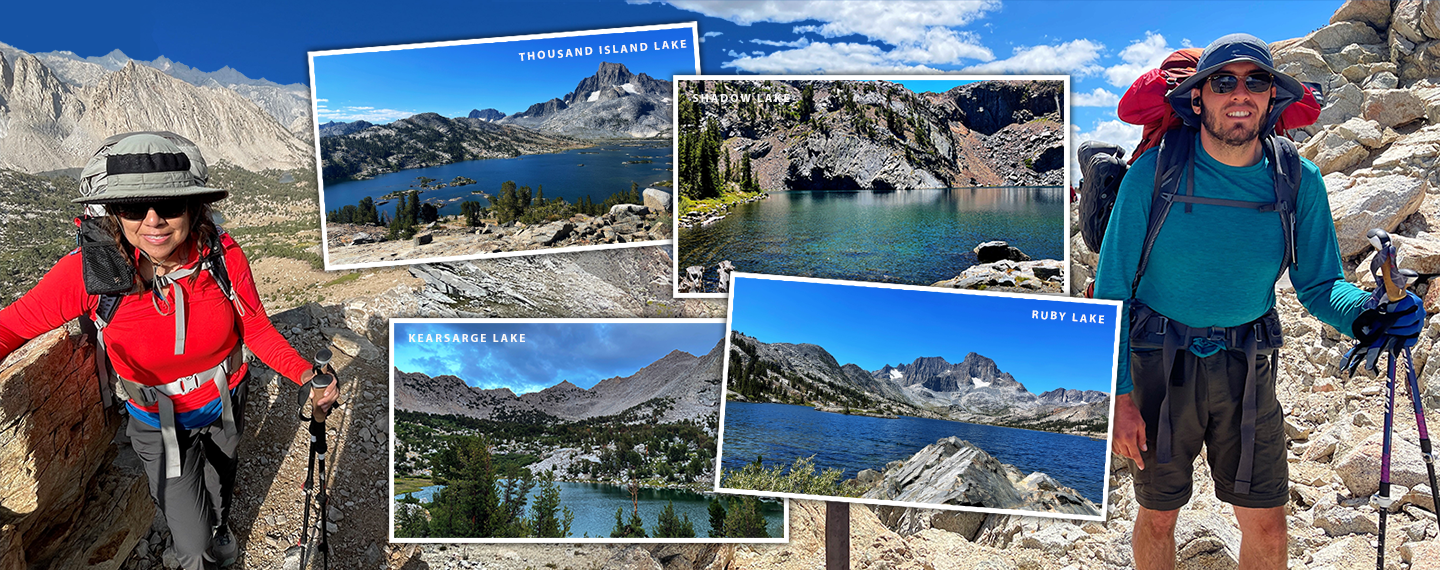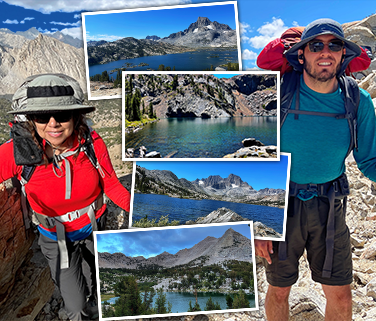This is part two of a story about Suzanne's journey. See the original story here. Suzanne's story was a part of her participation in the Dempsey Challenge, a partnership between Amgen and the Dempsey Center.
Her son was sick, the storm clouds were menacing and Suzanne Towry's body ached. Mount Whitney loomed in the distance – the prize peak that she so desperately wanted to summit.
But things weren't going to plan three days into their 12-day hike along California's John Muir Trail. Tough decisions had to be made.
They could try and scale it, but the risks were two-fold: Get caught by a menacing storm or further exacerbate her son's Acute Mountain Sickness (AMS) that had been developing since the day before. Towry, who works in Learning and Development at Amgen and had years of search and rescue experience, knew both problems could prove fatal on an unforgiving mountain. Three hikers had to be rescued from the mountain the day they were supposed to summit.
She thought about what her husband might do in the moment.
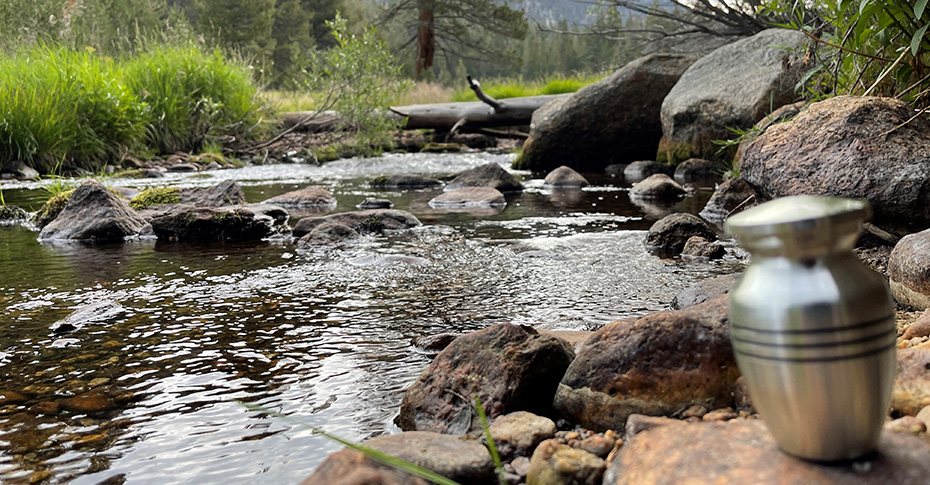
Suzanne Towry brought ashes of her husband, Emile "Knute" Pourroy along with her on the hike of the John Muir Trail. This was taken along the Bubbs Creek Trail. Photo: Suzanne Towry
Emile "Knute" Pourroy was always the lead hiker and backpacker when they went out on the trails together. They had met as search and rescue team members; both shared a love of the outdoors, but she now realized she had relied on him more than she thought.
When cancer claimed him in October 2019 – a few years before the two of them had planned the ultimate hike along the John Muir Trail – she decided to hike it in his memory and bring his ashes along. It would be the fulfillment of a dream they had bonded over together. Mount Whitney would have been great to summit, but it wasn't the reason they were there.
Towry and her son decided to circumvent it. They still had about 10 more days and over 150 miles to go, climbing over several passes that would top over 13,000 feet. Besides, Mount Whitney wasn't going anywhere. She could try again another time.
"The longest hike I ever did with Knute was 28 miles in six days," she said. "This was going to totally surpass my record. It was going to be hard, but this was going to be a long journey in many ways anyway and I think Knute knew that."
First Days
The first steps toward the John Muir Trail were joyous. Surreal, too.
"I hadn't been backpacking on a long, hard trip without my husband and this was going to be a test of my skills," she said. "My son had little backpacking experience. I wasn't really nervous, but there was some adrenaline. I was just thinking 'let's put one foot in front of the other' and see how it goes."
They hiked through Cottonwood Pass and the first thing she noticed was how heavy the backpacks were. She had aimed to keep it under 30 pounds, but the pack was closer to 40. It was hot out there, too.
Hiking northbound on the John Muir Trail is generally considered a more difficult route than southbound for one key reason – the altitudes on passes and peaks come early in the hike and make altitude acclimation more critical.
Towry said they were still trying to get their "trail legs" – getting used to the pounding and twisting feet and ankles take on uneven paths over long distances – while also adjusting to the thinner air as they hiked.
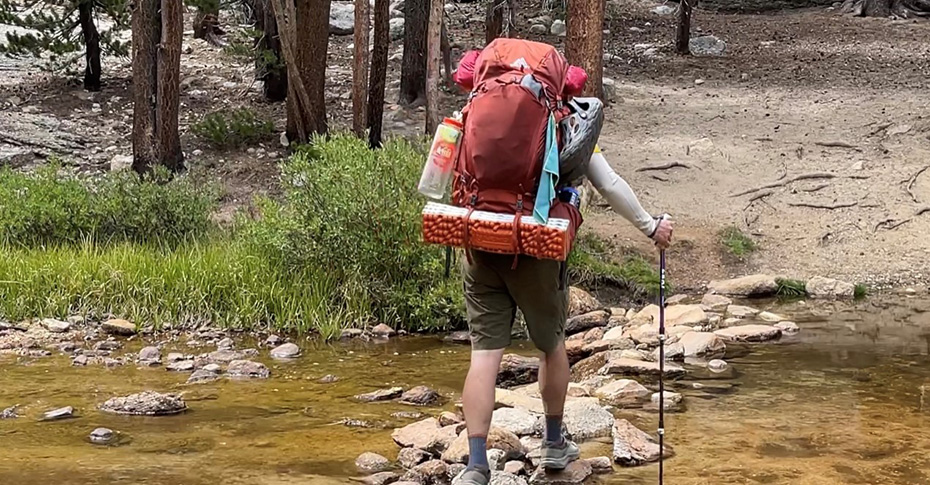
Joseph Towry crosses a stream along the John Muir Trail. Photo: Suzanne Towry
But she said they were having fun. Getting the first campsite set up helped them feel like they were on track and the reality of what they were doing began to settle on them. Towry also said they got their first gasp of natural beauty.
"Chicken Springs Lake doesn't look beautiful on the GPS, but when you get there, the water is turquoise," she said. "You start to feel the serenity of nature."
They had a pasta freeze-dried meal. They had also made a decision before leaving that would come back to haunt them later: they packed very few snacks to lighten the weight of their backpacks. That miscue made the freeze-dried meals a less-than-delicious option after days of hiking.
But that first meal was great, she said. At night, the stars filled the sky and a full moon bathed them in a soft glow. They talked through their tents. She thought of Knute and felt both close to him and alone at the same time.
She wondered what the coming days would bring.
Difficult Challenges
The early signs of AMS in Joseph Towry came with feelings of dehydration.
She said they had planned to do about 10 miles that day to get to Rock Creek Lake. Very little of the hike would be flat.
"The thing about the John Muir Trail is you're almost always going up and down," she said. "My son couldn't get that concept. We would work so hard to get up and then go down, only to go up again. He would make comments that made me laugh. He was my comic relief."
But she noticed he was also hot and constantly thirsty. Her experience with search and rescue told her AMS might be setting in. Using a Garmin, which was tracking their progress, she texted a John Muir Trail expert who had helped her plan the journey and told him what was going on. He assured her there was a creek that they could get to where they could get water.
Joseph Towry said he didn't know he was in the early stages of AMS.
"I just figured I wasn't used to all of this," he said. "I noticed that when I got water and food, I felt a little better. It wasn't until the third day that I felt like crap."
Suzanne said she was feeling more comfortable with the surroundings, but by that night, she had chills. It wouldn't be until the next day she'd see why: a serious sunburn had blistered the skin on her arms.
The third day was supposed to be the Whitney day. But the storms were getting closer. The cloud cover made it cooler, but she said they both were taking Advil by then. He noticed she was exhausted and that the sunburns were bothering her.
They also were now in a stretch where they might see only one or two people every few hours. No cell service, either.
Joseph Towry said it became a matter of having no choices.
"My mindset was you can't stop and turn around – there's nowhere to go but forward," he said. "Every day, you just get up and go and sometimes it sucks but you can't really quit. I'd just get myself up and see what my body is capable of."
'Nobody said it was this hard'
They had to get to Bighorn Plateau – a place Knute had said he always wanted to go – and the next day clear 13,200 foot Forester Pass.
But the storm was bearing down and occasional lightning bolts were striking the ground. The problem, she said, was at Bighorn, her and Joseph stood out. Dangerously.
"You don't want to be the tallest object when lighting is striking around," she said. "We had to get to the treeline and I don't think I've ever hiked that fast before."
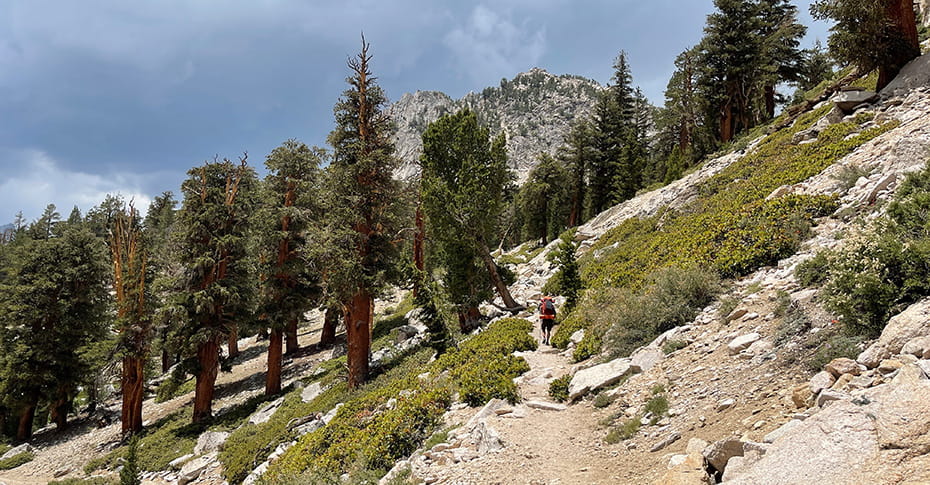
Suzanne Towry and Joseph Towry were chased by a powerful storm for the first part of their hike. This was a look at the storm clouds forming along the hike. Photo: Suzanne Towry
Her son was starting to recover from the AMS, too. He said he felt dizzy and sometimes at the highest altitudes had the sensation of being in a dreamlike state, but by the time they were able to set up camp, both were alternately pumped up with adrenaline and tired beyond belief.
They were a third of the way into their hike. They'd seen a lot of marmots, some deer and elk and a couple of snakes. At night, she said she heard some twigs snap, but didn't know what it was. Possibly a bear – though she said they never saw one the entire trip.
She said the next day was going to be one of the most challenging days – Center Basin to Kearsarge Lake.
When they started in the morning, it hit her quickly.
"All I kept thinking was, nobody said it was this hard," she said. "At this point, it became our job – to hike all day. But I could also tell our bodies were adapting."
Her arms were sore from the sunburn and she was wearing a long-sleeved covering that irritated the sensitive skin. She had to force herself to eat as the altitude was sapping her appetite. The snacks they hadn't packed would have been helpful now, she thought.
The storm had also touched their campsite again. Lightning had hit right outside their tent, she said. Rain began to pour down. "Torrential downpours," she said. The close call with one lighting strike was especially harrowing. She thought of Knute again and how he used to tease her about her fear of lightning.
Joseph Towry was also unhappy.
He said after Kearsarge Pass, he "never wanted to see another mountain again."
But then they crossed paths with three other women campers at the site. He said they boosted their mood. Empathized with their pain. Listened and agreed with their rants about how miserable it all felt. "They came just at the right time," Joseph Towry said.
Zero Day and Pep Talk
When they started to hike out to get supplies, a search and rescue buddy met them on the trail with a surprise.
"He literally dumped out a bag of snacks and said 'Ta-da!'" Joseph Towry said. "It was M&Ms, peanut butter and candy. It was so, so good."
He said his feet hurt badly and that sometimes each step felt like he was stepping on glass. The two of them fantasized about what kind of meal they'd most want. She said a pizza from a local shop in Mammoth. He craved a Double Western Bacon Cheeseburger with jalapeños from Carl's Jr.
Suzanne Towry said they needed to get off the trail and take a zero day. Zero days are days hikers build into long trips where they rest and recuperate before continuing. They hadn't planned on taking it so soon, but she could tell they both needed it. The storm was also getting worse, too, and she felt it wasn't safe.
Another search and rescue buddy and his wife who had known Knute and Suzanne for a long time drove them to a Motel 6 frequented by hikers. But the rest had another effect she wasn't counting on, either. The comfort of a bed made the discomfort of a sleeping bag and tent all the more real. When it came time to get back on the trail, she wasn't sure she wanted to get back out there again.
Bernie Courville said he rode with them back to the trail and could tell they needed a pep talk.
"I remember when she was a recruit at the academy and she was pushed and got through it," Courville said. "I mainly reminded her of that and how she made it through the challenges with flying colors. I knew she had what it took to get through it."
She said his words really helped her. Her son, she noticed, also seemed ready to go.
Suzanne Towry decided she was ready to get back on the trail. It was tough at first, she said, and she had to push to keep up with her son. It was a long day, but by nightfall, she said she could tell her body was already back to adapting to the new environment.
The pace was also different.
"That first week, we were being chased by a storm and I felt we were always pushing so hard and we hadn't really gotten a chance to do what Knute would have wanted us to do – take in the scenery. To soak in all that was around us. He would have said you don't have to kill yourself to enjoy yourself."
Reflection
She had Knute's ashes with her in a small urn and because of the frenetic pace, she hadn't really had a chance to sit with him along the trail.
Thousand Islands Lake was a picture that was on a binder that she used to have when she'd be with him as he was laid up with cancer. She said seeing the lake motivated him and she knew it was going to be a special place.
It was hot when they saw it – deep blue water, with rocks and sand around it. Small islands dotting the lake and she found a spot to sit and reflect. She took out his ashes.
"Here I am," she said to him. "Here is where we were supposed to be. You're here now."
Suzanne said she could feel his presence, telling her to take it all in and enjoy the moment. To live in the present and not be in such a rush to see what's next.
The weight she had been carrying for days wasn't just in her backpack. It wasn't her tent or her small stove or the fresh snacks or the sleeping bag. It was the weight of grief that had been on her since he died in 2019.
She said in that moment, she realized he always took care of her but she was now out on her own and having to take care of herself. She trusted him and always felt safe with him, no matter where they were. It was different now.
"I have to count on me and that's my new constant," she said.
Back to the World
The pace was no longer breakneck and all of the problems that seemed to have plagued them early weren't issues anymore.
They hiked through Donahue Pass, trod at elevations above 11,000 feet and Joseph showed no signs of AMS. It was hot and windy, but both felt like they were acclimating to a life without business.
Descending down the trail in Yosemite Valley and toward Tuolumne Meadows, they could see vast expanses of green, lined with pine trees and the framing of large rocks that define Yosemite National Park. A river ran through it and she said it glistened in the sunlight like some sort of idyllic photo.
Suzanne Towry and her son kept going, their elevation dropping to about 8,000 feet. She said they began to come across more people who were starting their trek south on the John Muir Trail. As they approached the end, she noticed smoke from a nearby fire.
They had to catch a shuttle to get back to Mammoth, which would then be the place they would head from to eventually go back home to North Carolina. She said the bus driver who picked them up looked at them and told them they needed to wear a mask due to Covid-19 protocols.
She said they had masks in the pack and sat in the bus the entire way. Changed. Different.
Joseph Towry said a day doesn't go by where he doesn't think about the massive clusters of stars he could see on those dark nights and how being on the trail made him think about the big questions of existence and purpose.
Suzanne Towry said the hike brought her clarity after living in a fog with the death of Knute. She said she is more confident now and has plans to do it again. She said she knows Knute is proud of her.
And she knows Mount Whitney will still be there for her return.
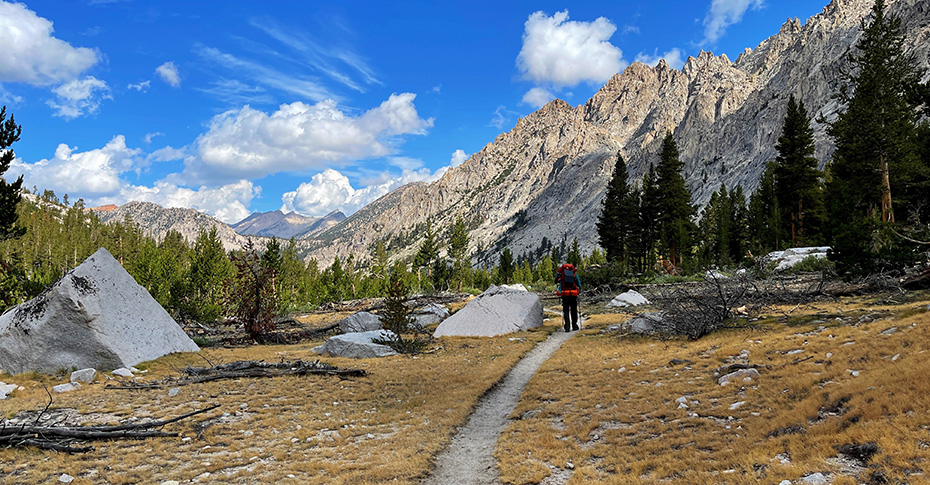
On their way to Tyndall Creek on the John Muir Trail. Photo: Suzanne Towry

